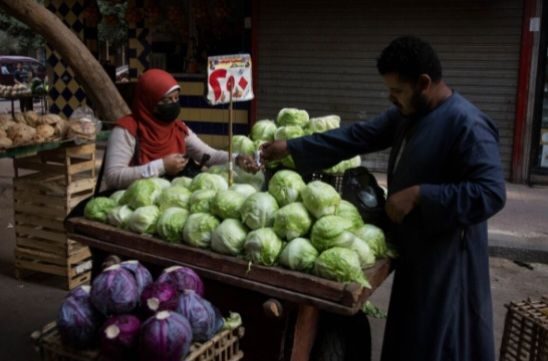
Egypt’s year-on-year headline inflation rose to a record 35.7% in June from 32.7% in May, official data showed on Monday, accelerating past the previous high reached in 2017 and reflecting acute economic strains since early last year.
Consumer prices in Egypt soared at a record pace, a reflection of pressures on food costs after the Muslim feast holiday and a pick-up in summer spending.
Analysts had expected the country’s headline inflation rate to jump to an all-time high, a Reuters poll showed on Thursday, as an unfavorable base effect and increased demand over the Eid al-Adha holiday kick in.
Inflation in urban parts of the country quickened sharply in June to an annual 35.7%, from 32.7% in the previous month, according to figures released Monday by the state-run CAPMAS statistics agency. It’s the fastest in data going back to December 2009.
The upswing was fueled largely by an 65.9% rise in food and beverage costs, the largest single component of the inflation basket, as well as the statistical effect of a low base last year. On a monthly basis, the inflation rate came in at 2.1% from 2.7% in May.
The surge past the peak reached in the aftermath of a currency crisis in 2016 speaks to the challenges that now confront the government as it struggles to revive an economy battered by the aftershocks of Russia’s invasion of Ukraine.
The country, in a preamble to securing a $3 billion deal with the International Monetary Fund, devalued the pound three times since March 2022 but has kept it stable since the last one in January.
The initial moves helped drive up the cost of most imported goods and stymied government efforts to cut spending as it battled its worst foreign-currency crisis in years.
Egypt recently raised the prices of some subsidized commodities such as rice and sugar. Egypt’s Abdel-Fattah al-Sisi warned recently that the nation wouldn’t be able to bear more cost increases — comments widely interpreted as him downplaying expectations of another devaluation any time soon.
Inflation has been a key concern for the central bank, even as its Monetary Policy Committee last month left interest rates unchanged at a level far below inflation. It targets price growth of 7%, plus or minus 2 percentage points, by the fourth quarter of next year.
Increases in electricity tariffs, which the government has deferred in an effort to soften the impact of inflation, could reinforce price pressures through the summer.
“Assuming we see power tariffs being hiked in July, annual inflation could remain high for a longer duration,” said Allen Sandeep of Naeem Brokerage.
“Without the power tariff hike, we might see some cooling off in July because of the favourable base year.”
Egypt has devalued its currency by about half since March 2022 after the fallout from Russia’s invasion of Ukraine exposed its economic vulnerabilities.
In December, the International Monetary Fund (IMF) approved a $3 billion Extended Fund Facility loan for Egypt to be disbursed over 46 months.
However, the first review of the program has been delayed amid uncertainty over Egypt’s pledge to move to a flexible exchange rate.
Economists say that authorities are working to build up a sufficient foreign-currency buffer before enacting another devaluation, and moving to what they’d pledged would be an exchange rate determined by the market.
Central bank Governor Hassan Abdalla earlier this year suggested higher rates could do little to contain price growth that he described as stoked mainly by supply issues. The MPC next plans to meet on Aug. 3.



